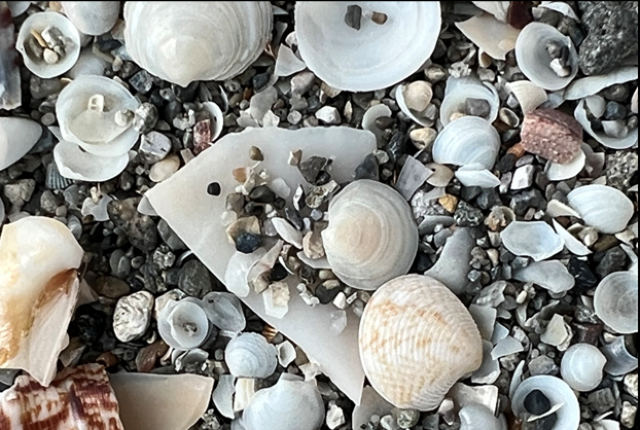Multibeam echosounder mapping of a seabed that has been subjected to trawling. The multibeam technique provides a detailed image of the seabed. Credit: Giuseppe Catalano (Geonautics)
Human activity is changing not only the balance of the ecosystems that sustain our planet, but also our ability to interpret the recent past through the remains of organisms accumulating on the seabed. This is the warning issued by an international group of researchers who, in the journal Biogeosciences present a framework for understanding how marine biocoenoses, and in particular the 'fossils' they produce, are changing (due to anthropogenic impacts).
"Human activity already plays a significant role in altering the way biological traces of both the recent past and those currently accumulating on the seabed are preserved. This will only increase if the anthropogenic impacts on ecosystems remain high", explains Daniele Scarponi, Professor at the Department of Biological, Geological and Environmental Sciences at the University of Bologna, one of the authors of the study. "All of this affects how we preserve historical evidence and consequently alters (and in many cases reduces) our ability to reconstruct recent changes in marine ecosystems".
Shells and other skeletal remains dating back hundreds or thousands of years can be found in the surface sediments of the seabed, allowing us to reconstruct the abundance and richness of 'biotic communities' that lived in environments characterised by low anthropogenic impact. This palaeoecological information can then be compared with the abundance and richness of the communities currently inhabiting the same marine environments, providing important clues as to the current state of ecosystem degradation.
Multibeam echosounder mapping of a seabed that has been subjected to trawling. The multibeam technique provides a detailed image of the seabed. (Image: Giuseppe Catalano - Geonautics)
The 'fossils' found in marine sediments therefore contain a wealth of information about the ecological changes that have taken place over the past decades, centuries and millennia. This evidence helps scientists understand how the climate has changed and how human activity has altered marine ecosystems over time. However, the same human activities that are changing ecosystems are also changing the fossil record and thus our ability to reconstruct the recent history of past anthropogenic impacts.
Indeed, ocean acidification and the spread of invasive species are all human-induced processes that alter both the quality of the fossil record and the potential for organogenic remains of present-day communities to be transferred into the sedimentary record.
On the latter point, the example of the red king crab (Paralithodes camtschaticus), or 'our' blue crab (Callinectes sapidus), voracious predators introduced into the Barents and Adriatic Seas respectively, is particularly relevant. They are causing the disappearance of the 'clam' communities in these seas, altering ecosystems and reducing the likelihood of these shells being preserved in the fossil record.
Another example is trawling, which alters and mixes the sediments preserved on the seabed, limiting our ability to accurately read the fossil record and ultimately reconstruct recent environmental changes.
"This is why", concludes Professor Scarponi, "it is very important to understand the implications of these changes, otherwise we risk misinterpreting the fossil record and limiting our ability to reconstruct the recent past of modern ecosystems.


